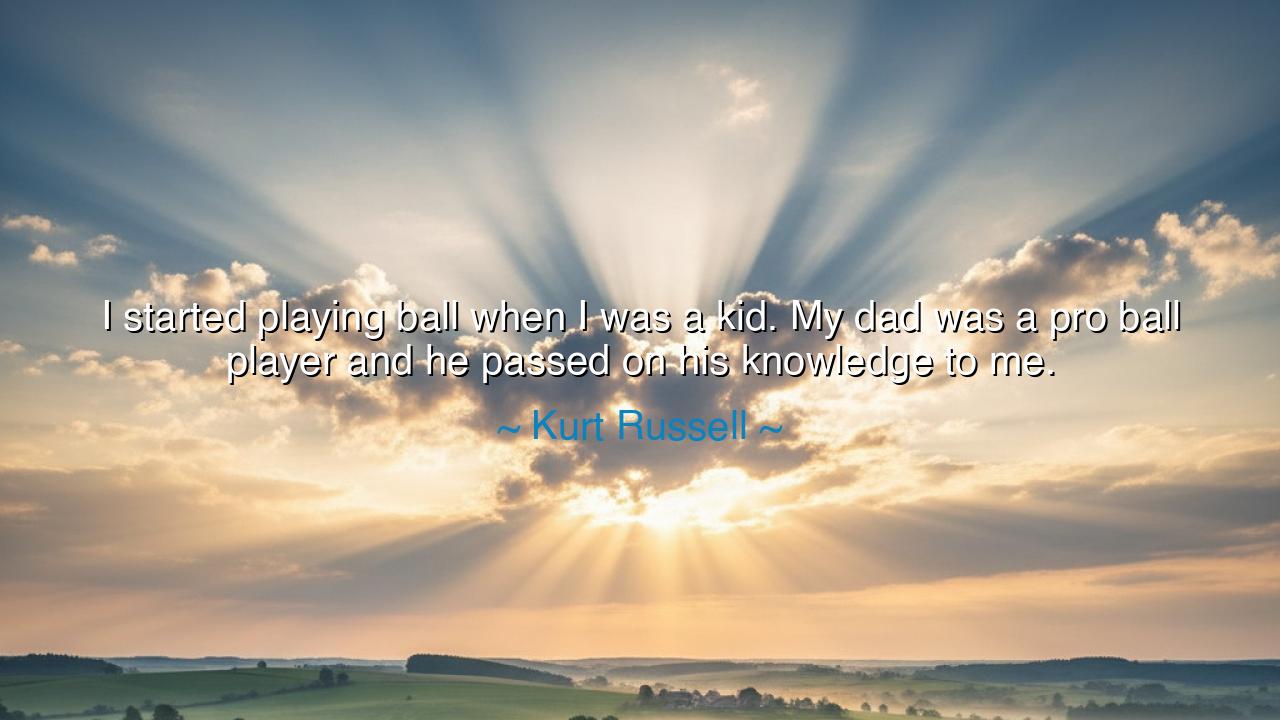
I started playing ball when I was a kid. My dad was a pro ball
I started playing ball when I was a kid. My dad was a pro ball player and he passed on his knowledge to me.






When Kurt Russell said, “I started playing ball when I was a kid. My dad was a pro ball player and he passed on his knowledge to me,” he was not simply reminiscing about childhood or sport — he was honoring the ancient lineage of learning, the sacred chain by which wisdom is handed down from one generation to the next. Beneath his humble words lies a truth that echoes across centuries: that skill, discipline, and love are inherited not by blood alone, but by the sharing of practice and example. His father’s lessons were not merely about the mechanics of the game, but about the rhythm of effort, the meaning of mentorship, and the bond that forms when knowledge passes from hand to hand like a well-thrown ball.
The origin of this reflection is found in the life of Kurt Russell himself, who, long before his rise to fame as an actor, dreamed of life on the baseball diamond. His father, Bing Russell, was both an actor and a professional baseball player — a man who understood the discipline of sport and the art of performance. Under his father’s guidance, Kurt learned not only how to play, but how to persevere, how to read the world through the logic of the game. To play ball was to understand timing, teamwork, patience, and grace under pressure — lessons that would serve him throughout his life. In this way, the father’s wisdom became the son’s foundation, a legacy built not of wealth or fame, but of values forged through motion and memory.
There is something deeply heroic and timeless in this act of passing down knowledge. In every age, fathers, mothers, and mentors have shaped the destinies of those who came after them, teaching not by command but by example. The Greeks told stories of Achilles and his teacher Chiron, the wise centaur who instructed heroes not only in battle but in the ethics of strength. The wisdom of one generation is the seed of the next, and the student who receives it with humility becomes, in time, a teacher to others. In the simple act of teaching his son to throw a ball, Bing Russell participated in this eternal rhythm — the sacred exchange of experience for trust, and effort for love.
The words “he passed on his knowledge to me” carry a reverence that extends beyond the world of sport. They remind us that all great mastery is communal, that no one begins as a master. Every craftsman, artist, and thinker stands upon the shoulders of those who came before. Just as Kurt learned the grip of the ball from his father, so too did Michelangelo learn the brush from Ghirlandaio, or the young samurai learn the sword from his sensei. True wisdom cannot be read — it must be lived beside another, absorbed through shared effort and devotion. It is through this closeness that the heart learns what the mind alone cannot grasp.
Kurt’s words also reveal the emotional inheritance of mentorship. The bond between father and son, teacher and pupil, is not forged in instruction alone, but in the joy of shared striving. The father watches the son’s first attempt — awkward, uncertain — and sees not imperfection, but promise. The son, in turn, sees in the father not an authority, but a guide, a living example of what might be possible. And when, one day, the son surpasses the teacher, the cycle is complete. The torch is passed, not extinguished, for every act of teaching multiplies what is known. Thus, knowledge, like a flame, grows brighter the more it is shared.
In this way, Russell’s reflection becomes more than personal memory — it becomes a parable of continuity. For all of us, there comes a moment when we must look back at those who shaped us, acknowledge the debt we owe, and choose to pass on what we have learned. Whether we teach our children, our students, or those who follow in our craft, we become links in the same immortal chain. The father who teaches the son to play, the mentor who guides the apprentice, the leader who inspires the young — all become architects of legacy. The greatness of a life is not measured in what one achieves alone, but in what one awakens in others.
So, my child, take this lesson from Kurt Russell’s words: honor your teachers, and become one yourself. Remember that every skill, every wisdom you possess, was once given freely by another. Carry it with humility, and when your time comes, pass it on with love. Teach through patience, inspire through example, and never forget that true inheritance lies not in possessions, but in knowledge shared and spirit kindled. For in this way, as the father’s wisdom flows into the son, and the son’s into the world, nothing is ever lost — and the flame of human excellence burns eternal.






AAdministratorAdministrator
Welcome, honored guests. Please leave a comment, we will respond soon